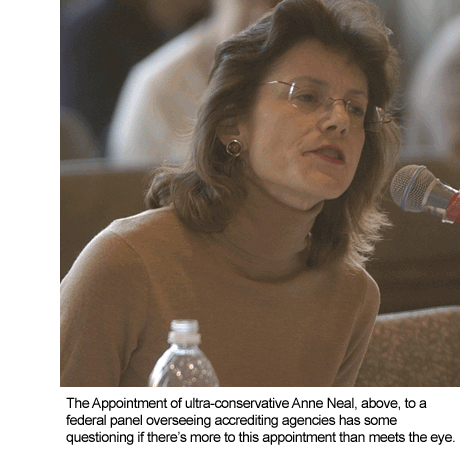
The appointment this spring of Anne D. Neal, president of the American Council of Trustees and Alumni (ACTA), to a U.S. Department of Education panel overseeing accrediting agencies is fueling fears that the department is becoming ever more politicized under U.S. Education Secretary Margaret Spellings.
Spellings appointed Neal to the National Advisory Committee on Institutional Quality and Integrity (NACIQI), a panel of 15 appointees that advise the secretary on accreditation matters. The Bush administration is using the panel as its primary tool for implementing recommendations of the secretary’s Commission on the Future of Higher Education, another political body that completed its work last year.
“Through NACIQI and a negotiated federal rule process, the secretary appears to be trying to impose standards and regulations that normally are under the aegis of the Higher Education Act (HEA),†said UUP President William Scheuerman, an AFT vice president. “In effect, she’s doing an end run around Congress, which is several years overdue in reauthorizing the HEA.†Scheuerman also chairs AFT’s Higher Ed Program and Policy Council.
Neal’s appointment to NACIQI took many by surprise because of ACTA’s past calls for the dismantling of accreditation. Skeptics asked, could ACTA’s CEO maintain an open mind and objective stance as she served on the panel that provides recognition of accrediting agencies?
The answer came quickly when ACTA released “Why Accreditation Doesn’t Work and What Policymakers Can Do About It,†in July. In the foreword, Neal writes: “In our 2002 investigation … we found that accreditation did not ensure quality, was not protecting the curriculum from serious degradation, and was giving students, parents and public decision-makers almost no useful information about institutions of higher education. Our new investigation finds that things have become worse.â€
She adds: “Today, accreditation is bad education policy that undermines the autonomy of our educational institutions while doing nothing to ensure academic quality.â€
Neal’s attacks are not limited to accreditation. She and conservative David Horowitz have mounted campaigns that advocate externally imposed restrictions on faculty and institutions, so as to make the enterprise more user-friendly to the spread of conservative ideology. Horowitz’s vehicle is the so-called “Academic Bill of Rights†(ABoR) — model legislation that has been introduced (but failed to pass) in numerous states. Neal’s organization calls for trustees and state legislatures to pass measures promoting “intellectual diversity,†a sort of affirmative action program for conservatives.
Free Exchange On Campus, a watchdog coalition co-founded by the AFT. is working to keep students and faculty apprised of the right-wing efforts to curb campus speech and learning.
This spring, Free Exchange released a background report (available on the Web site www.freeexchangeoncampus.org) on ACTA’s well-funded roots in the far right. Among its co-founders were Lynne Cheney, wife of Vice President Dick Cheney and former chair of the National Endowment for the Humanities, and Sen. Joseph Lieberman (D-Conn.), who has since disassociated himself from the organization.
After the 9/11 attacks, ACTA released a report called “Defending Civilization: How Universities Are Failing America and What Can Be Done About It.†It charges that professors have been the “weak link†in America’s response to the attack, as its primary author, Neal, puts it.
Appointing Neal to NACIQI, says Free Exchange, is putting the fox in the accreditation henhouse.
In fact, as a May 1, 2007, Inside Higher Ed article makes clear, Neal is in good political company on the NACIQI panel, for an inordinate percentage of the 15 appointed panelists are either from Texas (4), have close political ties to the administration (3) and represent the interests of the for-profit sector (3).
Other kindred spirits of Neal include Candace de Russy, a former SUNY trustee who spent the last decade trying to limit the academic prerogatives of faculty. (Most recently, de Russy tried to get the SUNY board to adopt ABoR language restricting faculty control over curriculum and hiring decisions. The board voted her down.)
Spelling’s controversial appointments and her efforts to use negotiated rule making to change interpretations of federal higher education law have led members of both the U.S. Senate and House of Representatives have moved to clip Spellings’ wings. On May 25, Sen. Lamar Alexander (R-Tenn.) made a speech on the floor of the Senate stating that the U.S. Education Department’s actions would “restrict autonomy, choice and competition.â€
“Such changes are so fundamental that only Congress should consider them,†he warned.
On June 8, members of the House added a provision to an education spending bill that would prohibit the Education Department from using funds to promulgate new accreditation regulations.
And June 14, 18 of 21 members of the U.S. Senate Committee on Health, Educa-tion, Labor and Pensions signed a letter to Spellings asking her to “refrain from proposing new regulations on accreditation until after the Higher Ed Act is reauthorized.â€
Congress is expected to take up Higher Education Act reauthorization this fall. But those who support free speech and oppose political intrusions on campus should keep an eye out for new incursions of conservative ideology and “intellectual diversity†emanating from groups like Neal’s. She and her organization’s “intellectual diversity†agenda are not likely to go away.
— Denyce Duncan Lacy and Barbara McKenna

